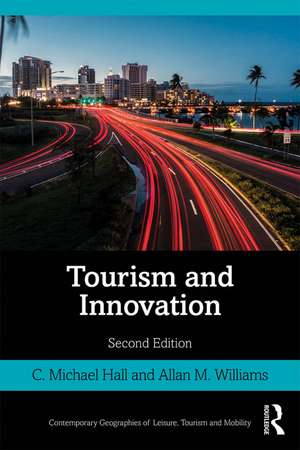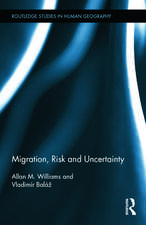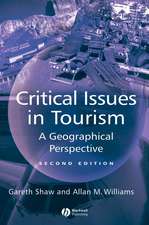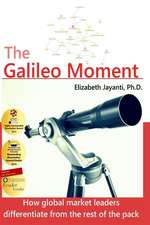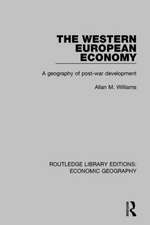Tourism and Innovation: Contemporary Geographies of Leisure, Tourism and Mobility
Autor C. Michael Hall, Allan M. Williamsen Limba Engleză Paperback – 9 dec 2019
Innovation is a key concept in business and entrepreneurial studies and the broader social sciences. Yet, despite its policy and academic importance, historically little attention has been given to the role of innovation in tourism and the corresponding contribution of tourism-related human mobility to regional, firm and product innovation. This book highlights that innovation in tourism is much more than a series of technological innovations, as important as they are, and instead needs to be understood in an economic, social and political context with particular stress being placed on the extent to which innovations are shaped by the framework of governance and regulation, as well as by institutional factors and activities of individual actors and entrepreneurs.
It is structured so as to introduce the reader to the overall significance of innovation, at various levels, and the role that innovation plays in firm and place competition. Supported with case studies throughout, this book is essential reading for all Tourism students.
| Toate formatele și edițiile | Preț | Express |
|---|---|---|
| Paperback (1) | 399.45 lei 6-8 săpt. | |
| Taylor & Francis – 9 dec 2019 | 399.45 lei 6-8 săpt. | |
| Hardback (1) | 1272.54 lei 6-8 săpt. | |
| Taylor & Francis – 3 dec 2019 | 1272.54 lei 6-8 săpt. |
Din seria Contemporary Geographies of Leisure, Tourism and Mobility
-
 Preț: 311.41 lei
Preț: 311.41 lei -
 Preț: 311.41 lei
Preț: 311.41 lei -
 Preț: 311.41 lei
Preț: 311.41 lei -
 Preț: 326.49 lei
Preț: 326.49 lei -
 Preț: 325.97 lei
Preț: 325.97 lei -
 Preț: 324.71 lei
Preț: 324.71 lei -
 Preț: 311.51 lei
Preț: 311.51 lei -
 Preț: 296.80 lei
Preț: 296.80 lei -
 Preț: 310.65 lei
Preț: 310.65 lei -
 Preț: 233.53 lei
Preț: 233.53 lei -
 Preț: 356.63 lei
Preț: 356.63 lei -
 Preț: 355.44 lei
Preț: 355.44 lei - 18%
 Preț: 1057.89 lei
Preț: 1057.89 lei - 18%
 Preț: 1057.40 lei
Preț: 1057.40 lei - 30%
 Preț: 850.91 lei
Preț: 850.91 lei - 18%
 Preț: 1165.73 lei
Preț: 1165.73 lei - 18%
 Preț: 1379.90 lei
Preț: 1379.90 lei - 18%
 Preț: 710.40 lei
Preț: 710.40 lei - 18%
 Preț: 1058.69 lei
Preț: 1058.69 lei - 18%
 Preț: 1222.85 lei
Preț: 1222.85 lei - 18%
 Preț: 1056.00 lei
Preț: 1056.00 lei - 18%
 Preț: 1220.63 lei
Preț: 1220.63 lei - 18%
 Preț: 1115.21 lei
Preț: 1115.21 lei - 18%
 Preț: 1056.00 lei
Preț: 1056.00 lei - 26%
 Preț: 765.43 lei
Preț: 765.43 lei - 18%
 Preț: 1055.51 lei
Preț: 1055.51 lei -
 Preț: 415.67 lei
Preț: 415.67 lei - 18%
 Preț: 1051.10 lei
Preț: 1051.10 lei -
 Preț: 416.26 lei
Preț: 416.26 lei - 18%
 Preț: 1223.21 lei
Preț: 1223.21 lei -
 Preț: 396.46 lei
Preț: 396.46 lei - 18%
 Preț: 1117.07 lei
Preț: 1117.07 lei - 18%
 Preț: 1056.35 lei
Preț: 1056.35 lei - 18%
 Preț: 1127.34 lei
Preț: 1127.34 lei - 18%
 Preț: 1062.47 lei
Preț: 1062.47 lei - 26%
 Preț: 822.54 lei
Preț: 822.54 lei - 18%
 Preț: 1119.16 lei
Preț: 1119.16 lei - 18%
 Preț: 1060.74 lei
Preț: 1060.74 lei - 26%
 Preț: 990.17 lei
Preț: 990.17 lei - 28%
 Preț: 848.98 lei
Preț: 848.98 lei - 18%
 Preț: 1336.32 lei
Preț: 1336.32 lei -
 Preț: 488.33 lei
Preț: 488.33 lei - 18%
 Preț: 1395.61 lei
Preț: 1395.61 lei - 26%
 Preț: 822.54 lei
Preț: 822.54 lei - 18%
 Preț: 1066.09 lei
Preț: 1066.09 lei
Preț: 399.45 lei
Nou
76.44€ • 80.01$ • 63.62£
Carte tipărită la comandă
Livrare economică 31 martie-14 aprilie
Specificații
ISBN-10: 1138060828
Pagini: 496
Ilustrații: 40 Tables, black and white; 40 Illustrations, black and white
Dimensiuni: 156 x 234 x 35 mm
Greutate: 0.68 kg
Ediția:2nd edition
Editura: Taylor & Francis
Colecția Routledge
Seria Contemporary Geographies of Leisure, Tourism and Mobility
Locul publicării:Oxford, United Kingdom
Public țintă
Postgraduate and UndergraduateCuprins
1. Introduction: understanding innovation as the key to understanding changes in tourism. 2. Competition, innovation, and productivity. 3. Knowledge, creativity, and innovation. 4. Technology and tourism innovation. 5. The state and tourism innovation: institutions, policy, regulation, and governance. 6. The regional innovation system: territorial learning, regions, cities, and smart specialisation. 7. Firm organisation and innovation. 8. Entrepreneurship, the market, and innovation. 9. Entrepreneurship and innovation pathways. 10. Public good entrepreneurship: community, place, social entrepreneurship, and innovation. 11. Conclusions: an innovative future for tourism.
References. Index.
Notă biografică
Allan M. Williams obtained his PhD from the London School of Economics, and held posts at the Universities of Durham, Exeter, and London Metropolitan before taking up his current position as Professor of Tourism and Mobility Studies at the University of Surrey. His central research interest is the relationship between mobility and economic development, especially relating to innovation, productivity, knowledge, and risk.
Recenzii
Professor Gareth Shaw, University of Exeter, UK
‘This pioneering book truly fills a significant research gap. All academics, policy analysts, industry representatives or anyone else with strong interests in how tourism is affected by innovative practices but also how tourism itself shapes innovation strategies at various spatial levels will find it of interest. It can be counted as one of a handful of texts that have appeared in the last decade that demonstrate a significant intellectual leap in tourism studies.’
Professor Dimitri Ioannides, Director of the European Tourism Research Institute (ETOUR), Mid-Sweden University, Sweden
Descriere
This ground-breaking volume on the relationships between tourism and innovation provides an overview of relevant innovation theories, and related literatures on entrepreneurship, productivity, regional development and competitiveness, and their significance to contemporary tourism practices.
Innovation is a key concept in business and entrepreneurial studies and the broader social sciences. Yet, despite its policy and academic importance, historically little attention has been given to the role of innovation in tourism and the corresponding contribution of tourism-related human mobility to regional, firm and product innovation. This book highlights that innovation in tourism is much more than a series of technological innovations, as important as they are, and instead needs to be understood in an economic, social and political context with particular stress being placed on the extent to which innovations are shaped by the framework of governance and regulation, as well as by institutional factors and activities of individual actors and entrepreneurs.
It is structured so as to introduce the reader to the overall significance of innovation, at various levels, and the role that innovation plays in firm and place competition. Supported with case studies throughout, this book is essential reading for all Tourism students.
